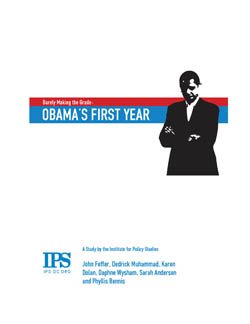IPS Fellow Phyllis Bennis directs the New Internationalism Project at IPS, focusing on the Middle East, U.S. militarism, and UN issues. She is also a fellow of the Transnational Institute in Amsterdam.
In 2001 she helped found the U.S. Campaign for Palestinian Rights and more recently spent six years on the board of Jewish Voice for Peace, where she now serves as its International Adviser. She works with many anti-war and Palestinian rights organizations, writing and speaking widely across the U.S. and around the world. She has served as an informal adviser to several top UN officials on Middle East issues and was twice short-listed to become the UN Special Rapporteur on Human Rights in the Occupied Palestinian Territory.
Phyllis has written and edited 11 books. Among her latest is the 7th updated edition of her popular Understanding the Palestinian-Israeli Conflict, published in 2018. She is also the author of Before & After: U.S. Foreign Policy and the War on Terror and Challenging Empire.
Stay up to date on events in the Middle East with the New Internationalism newsletter.




